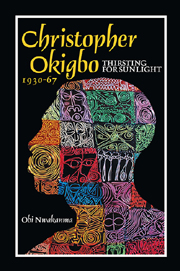Book contents
- Frontmatter
- Contents
- Preface
- Acknowledgements
- Chronology
- Dedication
- Photographs
- Maps
- Okigbo family tree
- 1 A river goddess, his mother's death & a headmaster father
- 2 Sportsman, actor & ‘effortless genius’
- 3 Cricket, classics, politics & urbane dissipation
- 4 Colonial civil servant, covert businessman & bankrupt
- 5 Poetry gives purpose to his voice
- 6 A librarian ravenous for literature & women
- 7 Gentleman, poet & publisher
- 8 Aftermath of a coup, running arms & advancing to death
- Epilogue
- Index
6 - A librarian ravenous for literature & women
NSUKKA 1960–62
Published online by Cambridge University Press: 05 April 2013
- Frontmatter
- Contents
- Preface
- Acknowledgements
- Chronology
- Dedication
- Photographs
- Maps
- Okigbo family tree
- 1 A river goddess, his mother's death & a headmaster father
- 2 Sportsman, actor & ‘effortless genius’
- 3 Cricket, classics, politics & urbane dissipation
- 4 Colonial civil servant, covert businessman & bankrupt
- 5 Poetry gives purpose to his voice
- 6 A librarian ravenous for literature & women
- 7 Gentleman, poet & publisher
- 8 Aftermath of a coup, running arms & advancing to death
- Epilogue
- Index
Summary
So would I to the hills again
So would I
to where springs the fountain
there to draw from
(‘Lustra IV’, Heavensgate)Nigeria's political independence from Britain in October 1960 was the culmination of years of political struggle by a generation led by Dr. Nnamdi Azikiwe, whose ideas shaped the meaning of the nation in West Africa in the twentieth century. There was also the need to establish a cultural identity and to retrieve the past from a history of colonial domination. When Christopher Okigbo relocated from Fiditi, in the deep heartland of Western Nigeria to the new University of Nigeria at Nsukka in the Eastern region, the fragrance of national celebration still clung to the air. The mood was celebratory:
Thundering drums and cannons
in palmgrove:
the spirit is in ascent.
He wrote of that moment. The 1960s was a remarkable decade in the history of the black race – long held back by years of colonization and despoliation. Independence meant that a new reality had dawned for Okigbo's generation. The colonial child was now a man. Okigbo's poem expressed high hopes for Africa at the threshold of its own historical rebirth. Time had assumed a clearer, more precise order and proportion. The spirit was truly in ascent.
As both witnesses of colonialism and inheritors of the legacies of national liberation, Okigbo's generation felt called to exercise a moral power and to signify the great sense of national awakening.
- Type
- Chapter
- Information
- Christopher Okigbo 1930–67Thirsting for Sunlight, pp. 146 - 173Publisher: Boydell & BrewerPrint publication year: 2010



